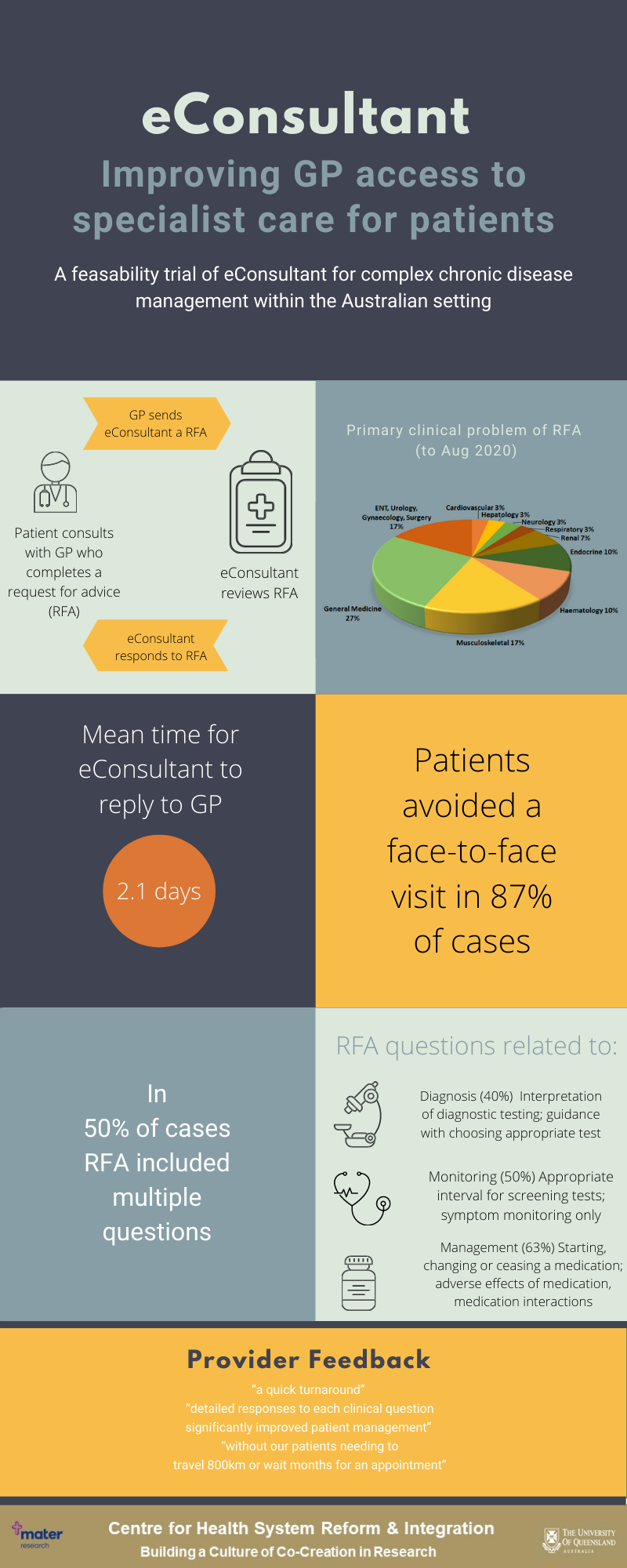Queensland eConsultant Partnership Program
Demand for specialist services is increasing and health care services internationally have responded to increasing demand for timely, better-coordinated complex care by trialling electronic consultation systems (eConsult), which provide a way for GPs and their patients to access specialist input without requiring a face-to-face consultation.1 Significantly reduced wait times for specialist input and substantial avoidance of face-to-face hospital visits are established outcomes of the eConsult approach.
CHSRI is conducting research to investigate the impact of an asynchronous online eConsultant process linking GPs managing patients with complex chronic disease across Queensland with online specialist physicians, across a broad range of specialties. 3, 4
To achieve this objective, the research builds on existing partnerships between the research team and Queensland Health (QH), the Western Queensland Primary Health Network (WQPHN), the Brisbane South Primary Health Network (BSPHN), North Queensland Primary Health Network (NQPHN), Mater Misericordiae Ltd, Ontario eConsult/ Champlain Base, Royal Australian College of General Practice (RACGP) and the Australian Digital Health Agency (ADHA).
The research has four aims. To investigate the impact of the eConsultant model on:
- Health service delivery outcomes (e.g. time to specialist input, % of outpatient visits avoided, % potentially preventable hospitalisations and ED presentations avoided)
- Providers’ experiences
- Patients’ experiences of care
- Healthcare costs
These aims align with the Quadruple Aim approach, increasingly used for health services evaluations, which recommends initiatives simultaneously pursue four dimensions of performance when translating new models of service delivery: improving health outcomes, reducing costs, enhancing patients’ experience and improving the work life of providers.2
Publications
1Liddy C, Moroz I, Mihan A, Nawar N, Keely E. A Systematic Review of Asynchronous, Provider-to-Provider, Electronic Consultation Services to Improve Access to Specialty Care Available Worldwide. Telemed e-Health 2018: doi:10.1089/tmj.2018.0005.
2Tuot D, Liddy C, Vimalananda VG, et al. Evaluating diverse electronic consultation programs with a common framework. BMC Health Services Research 2018; 18(1): 1-11.
3 Job J, Donald M, Borg SJ, et al. Feasibility of an asynchronous general practitioner-to-general physician eConsultant outpatient substitution program: A Queensland pilot study. Aust J Gen Pract 2021;50(11):857-62. doi: 10.31128/ajgp-11-20-5707
4 Job J, Nicholson C, Calleja Z, Jackson C, Donald M. Implementing a general practitioner-to-general physician eConsult service (eConsultant) in Australia. BMC Health Serv Res. 2022 Oct 24;22(1):1278. doi: 10.1186/s12913-022-08663-2. PMID: 36280832; PMCID: PMC9589630.
Petre J, Donald M, Jackson C ‘Supporting complex care in General Practice via an eConsultant model of care: the Australian specialist perspective.’ Australian Journal of Primary Care 15 May 2023. https://doi.org/10.1071/PY22243
Job J, Nicholson C, Donald M, Jackson C, Byrnes J ‘An eConsultant versus a hospital-based outpatient consultation for general (internal) medicine: a costing analysis.’ BMC Heath Services Research 11 May 2023 23:478 https://doi.org/10.1186/s12913-023-09436-1.
Phd project available
eConsultant: improving equity and access to specialist care

